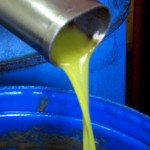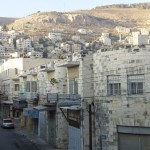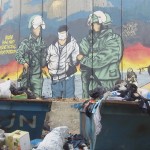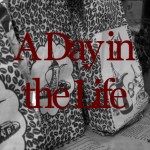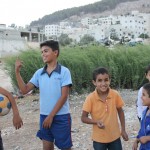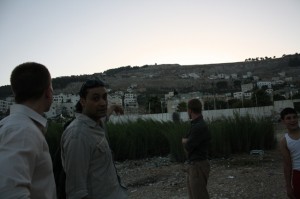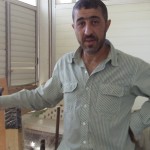
I traveled to Zababdeh, a town in northern West Bank near Jenin, to tour the local olive oil business on the anniversary of Arafat’s death. As I traveled from Bethlehem to Zababdeh, I passed a long line of buses with Palestinian flags fluttering out the windows, all headed to a commemoration in Ramallah.  After three hours and three buses, I arrived in Zababdeh and met my friend, Abuna Firas, a local Melkite priest, who whisked me off for the tour.
We visited three olive oil presses, two of which were finished with their harvest of olives, a small one this year, but the third was cranking away. The workers laughed as I videotaped them pouring olives into a pulsing machine. Next on the tour was an olive oil soap factory.
We walked into the back room of a small house where a woman was cutting soap bars to be dried on a wooden board. In the back yard, a vat of olive oil slowly boiled before it would be poured into boxes for setting. After coffee and a chat with the folks at the soap factory, we went to pick up Abuna Firas’s young boys from school.
We waited in the car queue with other parents, and Abuna Firas told me that the Christian and Muslim students each take classes about their own religion.
One time, the teacher came into his youngest son’s classroom to take the Muslim children to the appropriate classroom. Elias, Abuna Firas’s 6-year-old son, stood up to go with the Muslim children. When the teacher told him to sit, he asked, “Why? I’m Muslim!â€Â The teacher had to tell him that, actually, he’s Christian. He came home from school that day and asked his father if he is Muslim or Christian and Abuna Firas lovingly reminded him, “You are Christian.â€
We headed home for a delicious lunch, complete with a bowl of local olives. I sipped Arabic coffee with Abuna and his wife, Doris, while the boys watched SpongeBob Square pants (no less weird in Arabic). At 3:30, Abuna Firas drove me to the taxi stand to begin the long trek back to Bethlehem. He plopped me in a van to Jenin and paid for my fare. With a shake of hands and a “shukran katir,†I was off.
From Jenin, I grabbed a van to Ramallah.  Traffic inched along through Nablus and into Ramallah. By 6:30, I finally reached Ramallah only to find the bus station nearly empty.
No buses to Bethlehem, I was told by women wearing “I love Palestine†t-shirts.
A nice young man, Ahmad said he’d help me get home. He said he works for the P.A. as security for President Mahmoud Abbas who was at the commemoration ceremony in Ramallah.
We caught a bus a nearby village. He paid for my fare. From there we caught a car to Abudis, where he lives. He had 11 hours off before he had to guard the President next, but he spent the next hour helping me find a taxi. Soon I was off, in the front seat of the yellow cab, with a wave and a “shukran katir†to Ahmad.
Within minutes I was handed a piece of piping hot pizza and a plastic cup of Pepsi form the backseat. I hadn’t had pizza in months and it tasted like a little slice of sweet home Chicago. The three guys in the back laughed at their desperate attempts to speak English and mine to speak Arabic.
Once in Bethlehem, I gave the driver directions to my place near Aida Camp and asked how much the ride cost. He shook his hand. Nothing, even though it had taken at least 45 minutes! The guys in the back seat laughed and said, “Just go and don’t worry about it! We want to get to Hebron anyway, so hurry up!â€Â So, with a very sincere “shukran katir,†to the driver and my pizza friends, I shut the door.
I looked at the clock once I reached my apartment. Abuna Firas and Doris had taken care of me in Zababdeh and Palestinian hospitality had gotten me through the six-hour journey home. On the anniversary of Arafat’s death, many people rallied and waved flags and a handful helped one American lady get home safe. Shukran katir.
